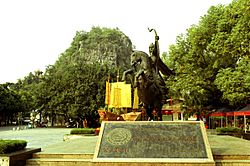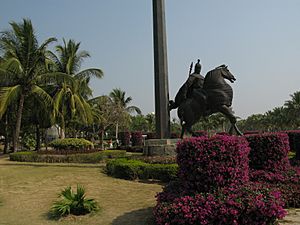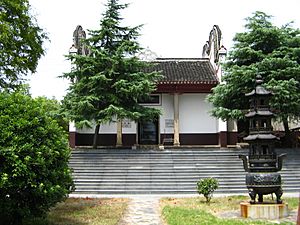Ma Yuan (Han dynasty) facts for kids
Quick facts for kids
Ma Yuan
馬援 |
|
|---|---|

Statue of Ma Yuan on Mount Fubo, Guilin
|
|
| Born | 14 BC Xingping, Shaanxi
|
| Died | 49 AD (aged 62) |
| Other names | Wenyuan (文淵) Marquis Zhongcheng (忠成侯) |
| Occupation | Military general, politician |
| Children |
|
| Parent(s) |
|
| Relatives |
|
Ma Yuan (Chinese: 馬援; 14 BC – 49 AD) was a famous Chinese military general and politician. He lived during the Eastern Han dynasty. His courtesy name, which was a special name given to adults in ancient China, was Wenyuan. He was also known by his official title, Fubo Jiangjun, which means "General who Calms the Waves."
Ma Yuan was very important in helping the Han dynasty defeat the Trung sisters' rebellion. He was a descendant of a brave general named Zhao She from an even older time in Chinese history.
Contents
Life and Achievements


Ma Yuan was born in a place that is now called Xingping in Shaanxi province. His family came from the ancient State of Zhao. He achieved many great things as a soldier and leader. He helped Emperor Guangwu bring different parts of the empire together. He also helped stop rebellions by the Trung Sisters in a region called Jiaozhi (which is now part of Vietnam). He also put down revolts by the Wulin tribes in areas that are now Guizhou and Hunan.
Ma Yuan became sick during a trip to modern Hunan in 49 AD and passed away soon after. Before that, he helped Emperor Guangwu defeat a powerful warlord named Wei Xiao. Wei Xiao controlled the eastern part of what is now Gansu.
A Respected General
Ma Yuan is known as one of the most famous generals in Chinese history. People remember him not just for his military victories but also for his strong character. He showed great determination and always treated his friends and soldiers with respect.
He also taught others about self-discipline and how to behave well. His daughter later became Empress Ma to Emperor Ming of Han. She was also highly respected by everyone.
Calming the Waves
One of Ma Yuan's biggest achievements was bringing the Nanman regions under control. This is why he earned his special title, "Queller of the Deep." People in that area admired him greatly, and a temple was built there to honor him. The land he brought under control is roughly the same as northern Vietnam today.
Ma Yuan was put in charge of the mission to stop the Trung sisters' rebellion. He was given the title Fubo Jiangjun, meaning "General who Calms the Waves." Ma Yuan and his team gathered a Han army of about 10,000 soldiers in southern China.
From Guangdong, Ma Yuan sent many supply ships along the coast. He led his army through difficult lands towards the Red River Delta. They arrived there in early 43 AD. The rebellion was brought under control by April or May of that year.
Defeating the Qiang Tribes
Ma Yuan also helped control the Qiang people. In 34 AD, some Qiang tribes attacked Chinese areas. Han armies defeated them. Ma Yuan, who was a leader in the Longxi area, continued to fight against the Qiang.
In 35 AD, the Xianlian tribe of the Qiang was defeated again. Ma Yuan captured more than ten thousand horses, cattle, and sheep. He also took a lot of grain. He was hurt in the leg during one of the last battles. Even though he didn't completely destroy the enemy, he pushed them away from the valleys. He was praised by the Emperor and received many of the animals he had captured.
Ma Yuan's victories in 35 AD weakened the Xianlian tribe. This helped the Chinese regain control of their old border areas.
Later Life and Reputation
In 49 AD, Ma Yuan was on a trip to fight the Wulin tribes. He became sick with a disease that also affected many of his soldiers. He passed away during this trip. After his death, some people who didn't like Ma Yuan, including his deputy and the Emperor's son-in-law, made false accusations against him.
They claimed that Ma Yuan was responsible for the disease because of the route he took. They also said he had taken valuable pearls and rhinoceros horns that weren't his. This last accusation was a misunderstanding. Ma Yuan loved a food called Chinese pearl barley, which he believed could prevent sickness. He had brought a lot of it back to the capital city, Luoyang.
Emperor Guangwu believed these false stories. He took away Ma Yuan's land and his special title after his death. However, Ma Yuan's good name was restored later. This happened when his daughter became empress to Emperor Ming, who was Emperor Guangwu's son, in 57 AD.
Famous Sayings
Ma Yuan is the source of two well-known Chinese idioms, which are like common sayings.
- One saying is "wrapping one's body with horse leather" (馬革裹屍). This means being so dedicated to your duties that you are willing to die on the battlefield. Ma Yuan said this when he explained why he wanted to continue serving in the military.
- The other saying is "drawing a tiger improperly results in a dog" (畫虎不成反類犬). This means if you try to copy someone famous but don't do it well, you might end up looking silly or like a bad person. Ma Yuan told this to his nephews. He warned them to be careful and not try to imitate a famous hero too closely, or they might become troublemakers instead.
Memorials and Temples
Ma Yuan is honored as a god in many temples in China and Vietnam. The Fubo Temples in Zhuzhou County, Hunan, and Heng County, Guangxi, are very famous. Mount Fubo and Fubo Park in Guilin, Guangxi, are also named after him.
In Hanoi, Vietnam, there was a temple called Bạch Mã đền that honored Ma Yuan. People worshipped there since the Han dynasty. However, the worship stopped when the Sino-Vietnamese War began in 1979. Historians believe it was a local tradition that the government ended due to tensions with China. Even in 1984, a report mentioned a statue of Ma Yuan still existing in the temple.
Similar temples for Ma Yuan also existed in other parts of Vietnam, like Cổ Loa, Thanh Hóa Province, Phú Yên Province, and Bắc Ninh Province in the 19th and 20th centuries. In one village in Bắc Ninh in 1938, people worshipped Ma Yuan along with the Trung sisters as their main protectors. In southern Vietnam, temples for Ma Yuan were often found in Chinese temples or areas where Vietnamese people of Chinese descent lived.
Some believe that Chinese immigrants brought the practice of worshipping Ma Yuan to Vietnam. However, historian Li Tana suggests it might have been the other way around. She thinks the Chinese might have adopted the worship of Ma Yuan from the Vietnamese. This is because worshipping Ma Yuan as a local spirit was already common in Vietnam, and he was called a bản thổ công ("local spirit").
|
 | Kyle Baker |
 | Joseph Yoakum |
 | Laura Wheeler Waring |
 | Henry Ossawa Tanner |

